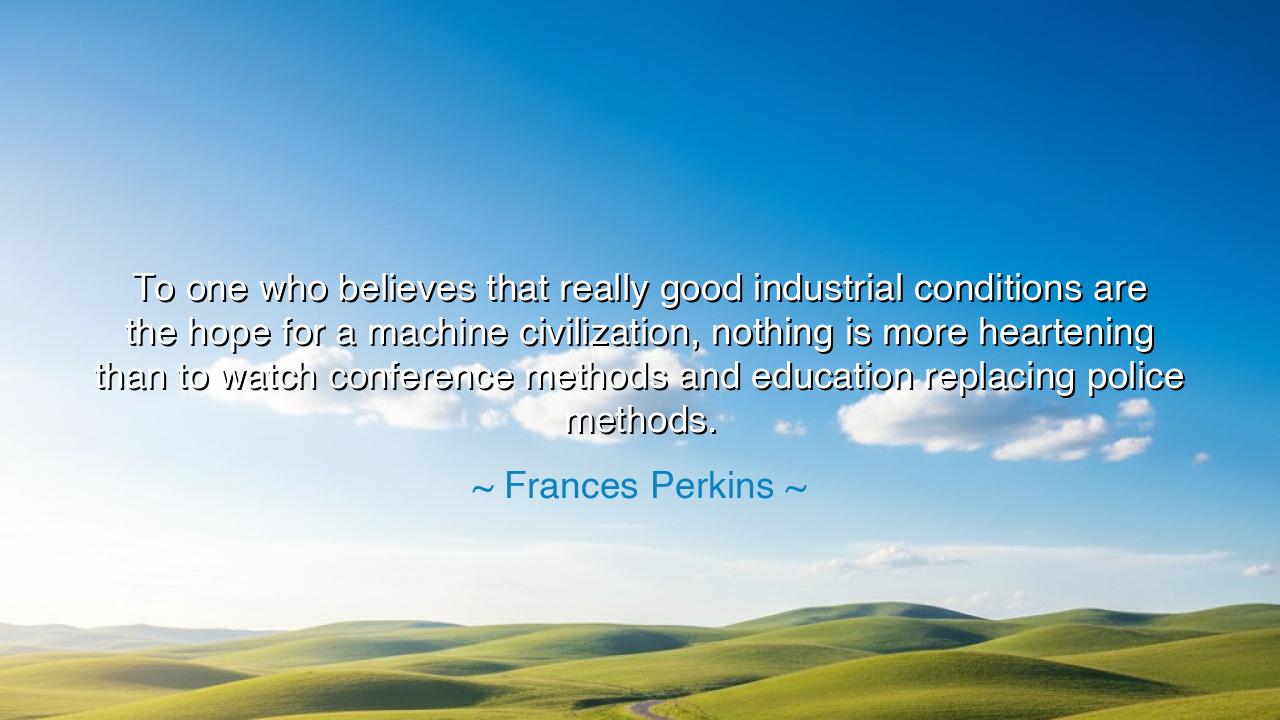
To one who believes that really good industrial conditions are
To one who believes that really good industrial conditions are the hope for a machine civilization, nothing is more heartening than to watch conference methods and education replacing police methods.






"To one who believes that really good industrial conditions are the hope for a machine civilization, nothing is more heartening than to watch conference methods and education replacing police methods." Thus spoke Frances Perkins, a woman of vision and conscience, who stood amidst the thunder of industry and sought not its silencing, but its harmony. In her words lies the cry of a soul that beheld the dawn of modern civilization — a world where the machine, born of human genius, threatened to enslave its maker. Yet she saw another way: that reason could replace force, that understanding could replace oppression, and that education could tame the engines of industry.
In the age of rising factories, when the hum of machines drowned the voice of men, Perkins stood as a prophet of compassion. She believed that the heart of civilization was not in iron and steel, but in justice — that to build a world worthy of machines, one must first build a world worthy of men. Her faith in “conference methods and education” was a belief in dialogue — in the sacred act of meeting across differences to seek wisdom together. For she knew that laws enforced by the truncheon could bend bodies, but never souls; only education and mutual respect could bind humanity in peace.
Behold, then, the story of the Triangle Shirtwaist Factory fire in 1911 — a moment that seared the conscience of a nation. Flames consumed the upper floors of a building in New York, trapping hundreds of working women, for the factory doors had been locked by their employers. One hundred and forty-six souls perished that day. Frances Perkins, standing among the ashes, was changed forever. From that inferno was born her conviction that industry must serve life, not consume it. She went on to become the first woman to serve in a U.S. Cabinet, shaping labor laws that would protect generations to come. Her dream was not revolution by force, but transformation by wisdom, compassion, and dialogue.
In her vision, the conference table became mightier than the policeman’s baton. There, across wood polished by earnest hands, men and women might meet not as enemies, but as partners in civilization. Such a table, she believed, was the true altar of progress — where the sacrifice was pride, and the offering was understanding. It is easy to command obedience with fear, but far greater is the power to awaken conscience through learning. This, Perkins saw, was the path to a machine civilization with a human soul.
Her words echo through time like the ring of a temple bell: if we would rule the machines we have made, we must first govern ourselves. The engines of industry, the circuits of artificial minds, the hum of modern cities — all these are extensions of human will. If our will be cruel, our machines will magnify cruelty; if our will be just, they will magnify justice. Thus, the destiny of the machine civilization depends not on gears or algorithms, but upon the moral education of humankind.
So let the reader take heed: the lesson of Frances Perkins is not one for factories alone, but for every sphere where power can overwhelm compassion. Replace force with dialogue. Replace fear with learning. Replace punishment with wisdom. Where there is conflict, seek council; where there is ignorance, sow knowledge. This is the eternal path of the peacemaker and the true builder of civilizations.
Therefore, in your life — whether you labor among machines, sit at the councils of men, or dwell in the quiet spaces of thought — remember that order born of fear is brittle, but order born of understanding is eternal. Build your own conference within your heart; speak kindly even when others strike; and educate not only your mind, but your spirit. For when the light of education dawns, the shadow of force recedes. Then, and only then, will our machine civilization become truly human.






AAdministratorAdministrator
Welcome, honored guests. Please leave a comment, we will respond soon